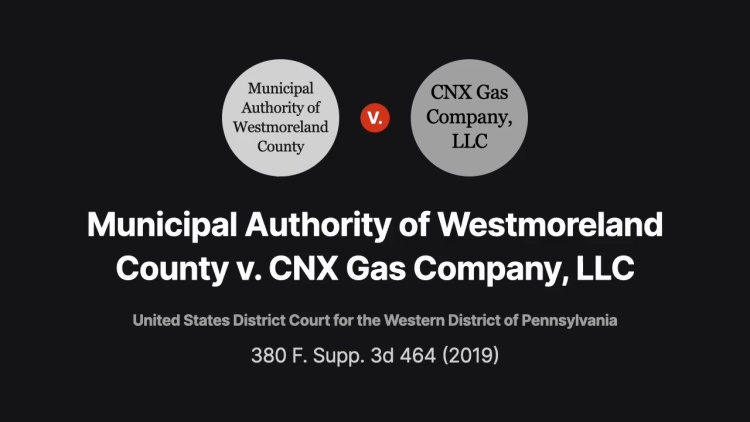Municipal Authority of Westmoreland County v. CNX Gas Company, L.L.C.
United States District Court for the Western District of Pennsylvania
380 F. Supp. 3d 464 (2019)

- Written by Kate Luck, JD
Facts
Municipal Authority of Westmoreland County (MAWC) (plaintiff) leased land to a predecessor of CNX Gas Company, L.L.C. (CNX), and Noble Energy, Inc. (Noble) (collectively, the lessees) (defendants) for oil and gas production. The lease permitted the lessees to deduct postproduction costs from royalties owed to MAWC. However, for eight years, CNX’s predecessor did not deduct postproduction costs from the royalties paid to MAWC. When CNX took over the lease, it did not deduct postproduction costs from its royalties for several months. However, midway through 2011, CNX began deducting postproduction costs. Despite the unaccounted-for deduction of postproduction costs, MAWC still exceeded its yearly projection for oil and gas royalties in 2011. For future years, MAWC adjusted its yearly projections to account for the deductions. In 2012 CNX assigned a portion of the lease to Noble, and Noble deducted postproduction costs from the royalties owed to MAWC. In 2015 MAWC brought suit against the lessees for breach of contract, alleging that the lease was modified, the postproduction-cost provision of the lease was waived, or that equitable estoppel applied to prevent the lessees from deducting postproduction costs. The lessees filed a motion for summary judgment.
Rule of Law
Issue
Holding and Reasoning (Conner, C.J.)
What to do next…
Here's why 907,000 law students have relied on our case briefs:
- Written by law professors and practitioners, not other law students. 47,100 briefs, keyed to 996 casebooks. Top-notch customer support.
- The right amount of information, includes the facts, issues, rule of law, holding and reasoning, and any concurrences and dissents.
- Access in your classes, works on your mobile and tablet. Massive library of related video lessons and high quality multiple-choice questions.
- Easy to use, uniform format for every case brief. Written in plain English, not in legalese. Our briefs summarize and simplify; they don’t just repeat the court’s language.





